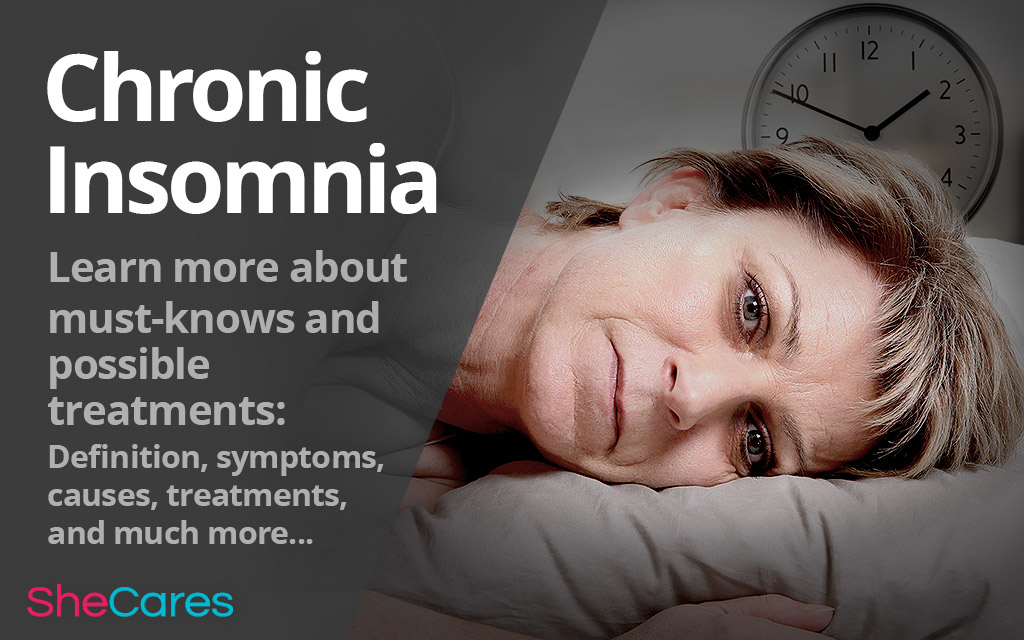One of the most common sleep disorders among adults, insomnia affects an estimated 30% or more of the population. However, many people suffer from short-term insomnia, which resolves itself after a few days or weeks. More damaging is chronic insomnia, which can last for months or years. To learn more about chronic insomnia, read on.
Recognizing Chronic Insomnia
Insomnia is defined by doctors as a condition that causes difficulty with sleep that can be expressed as difficulty falling asleep, difficulty staying asleep throughout the night, or waking earlier than intended.
Because insomnia can vary greatly in how severe it is, how long it lasts, and how often it occurs, there are different classifications for different types. Acute insomnia is a condition that is short-term, usually related to a severely stressful or traumatic life event that happened recently, and nearly always is resolved within a few days to a few weeks. Some doctors will not officially diagnose acute insomnia, since it lasts for so little time.
Chronic insomnia, on the other hand, lasts longer. In most cases, to receive an official diagnosis of chronic insomnia, the sleep difficulty must have been present for at least three months. It must also be present at least three nights per week in order to receive an official diagnosis. This type of long-term and constant sleep interruption can cause significant problems in mental functioning.
Symptoms of Chronic Insomnia
In addition to the main symptom of difficulty sleeping, insomnia often causes other secondary symptoms. Many of these symptoms are a direct result of diminished sleep, but they tend to develop after long periods of less sleep than is ideal. These include:
- Feeling as though sleep was unrefreshing
- Feeling fatigued during the day
- Mood swings, especially irritability
- Problems with memory
- Difficulty focusing
Causes of Chronic Insomnia
Insomnia is generally separated into two different categories based on its causes: primary and secondary insomnia.
Primary insomnia
It is insomnia on its own, as its own disorder. In other words, it is insomnia that has not been caused by bad habits. In the case of primary insomnia, the most likely cause is stress, followed by changes in routine such as travel or beginning work on a new shift. Primary insomnia can clear up quickly once the problem has been rectified, or it can last for years.
Secondary insomnia
It has insomnia that has a different underlying cause. This type of insomnia is usually a symptom or side effect of another health or mental condition. Conditions that may cause secondary insomnia include:
- Hormonal changes, especially those associated with menopause
- Depression, severe anxiety, or other mental illness
- Heartburn or other gastrointestinal problems
- Alzheimer's or other types of dementia
- Chronic pain disorders
- Stroke
Secondary insomnia can also be a result of certain medications or other drugs. Prescribed medications may cause sleep interruptions, but other common substances like alcohol, tobacco, and in particular caffeine are common culprits of insomnia.
Chronic Insomnia Treatments
Treating secondary insomnia involves treating the underlying condition, which may be simple or more difficult depending on the illness causing the insomnia.
It may also help to make a few lifestyle changes in order to help improve sleep. Some of the most useful changes to make are:
- Removing distractions like TVs from the bedroom
- Avoiding screens that emit blue light at night
- Setting a bedtime routine
- Relaxing before bed
- Reducing stress
Treating primary chronic insomnia; however, is usually not straightforward.
Sleeping pills
Often, those who suffer from insomnia go to a doctor hoping for a medical intervention like sleeping pills. While sleeping pills are available for insomnia sufferers - and many doctors will write a prescription for them - it is important to realize that medications may lose their effectiveness over time as the body builds up a resistance.
Cognitive behavioral therapy (CBT)
The main type of therapy for insomnia is cognitive behavioral therapy (CBT), which focuses on both thoughts and behavior. With a therapist, a patient can try to examine what negative thoughts they have about sleep that may be influencing their ability to fall sleep, as well as develop some behavioral techniques that can help them retrain their bodies to adjust to the right circadian rhythm.
Knowing about chronic insomnia is the first step to learning how to manage and treat it. For other methods to help manage insomnia and improve sleep, read about these herbal sleeping pills and remedies.
Sources
- Mayo Clinic. (2016). Insomnia treatment: Cognitive behavioral therapy instead of sleeping pills. Retrieved May 19, 2017, from http://www.mayoclinic.org/diseases-conditions/insomnia/in-depth/insomnia-treatment/art-20046677
- National Center for Complementary and Integrative Health. (2017). Sleep Disorders: In Depth. Retrieved May 19, 2017, from https://nccih.nih.gov/hesalth/sleep/ataglance.htm#hed5
- National Heart, Lung, and Blood Institute. (2011). Your Guide to Healthy Sleep. Retrieved May 19, 2017, from http://www.nhlbi.nih.gov/files/docs/public/sleep/healthy_sleep.pdf
- National Sleep Foundation. (2017). Cognitive Behavioral Therapy for Insomnia. Retrieved May 19, 2017, from https://sleepfoundation.org/sleep-news/cognitive-behavioral-therapy-insomnia
